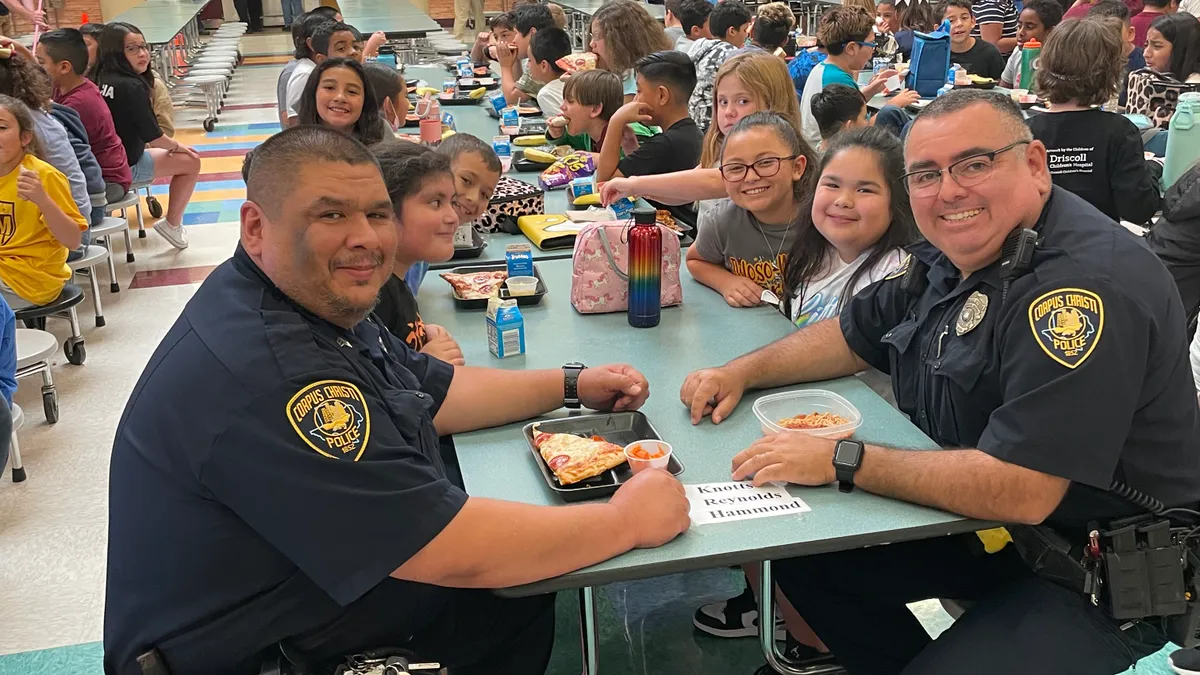Uniformed police officers from Corpus Christi, Texas, are invited to join students in Tuloso-Midway Independent School District campus cafeterias and enjoy free meals anytime their schedules allow. It's a program Superintendent Steve VanMatre started this school year to encourage stronger school-police relationships other than those built exclusively on school safety.
The student-police meal sharing program has given students an opportunity to see police in a relaxed environment, VanMatre said. "So many good things happen with this program. Unfortunately, [for] some of our kids, the only experience they have with police is negative so this puts police in a different light," he said.
The police never just eat and run either. "They're there for an hour," said VanMatre. The cost to feed the officers this school year? $50,000 — a price VanMatre says is "well worth it."
As school districts like Tuloso-Midway prioritize campus security in light of the Uvalde, Texas, shooting in May that killed 19 students and two teachers, they are balancing those efforts with other collaborations to improve school-police relationships.
Some oppose police presence in schools because of a higher risk for student arrests for noncriminal activity, which can contribute to the school-to-prison pipeline. However, many agree that school-police relationships need to be strong in case there's an emergency on campus that school staff alone can't control.
Additionally, police and school officials said, nonsecurity activities between schools and police can have added benefits, such as building trust with students, staff and parents, facilitating joint training programs for student mental health supports, and contributing to academic collaborations.
Safety remains the priority
These nonsecurity activities can also contribute to better coordination and communication when there is an emergency on campus, said James Hawthorne, police chief of the Cedar Hill Independent School District in Texas.
Hawthorne said because of what happened in Uvalde, most of the coordination between the Cedar Hill school system and local law enforcement is concentrated on campus security, including intruder audits, ensuring classroom doors are locked, developing and testing communication protocols, reunification exercises and more.
The district and the Cedar Hill Police Department team up each summer to host a Youth Summit for middle and high school students. The summit offers a variety of activities, such as crime scene investigation simulations, classes in youth rights under the law and role-playing with DWI goggles and pedal carts to simulate driving while intoxicated, Hawthorne said.
These activities teach students about the dangers of drunk driving and can increase students' interest in careers in law enforcement and legal fields, Hawthorne said.
"I think it's imperative that you form relationships with the local law enforcement and understand how they can help you," he said.
Partnering in education and mental health
A partnership formed this year with the Tennessee Board of Regents, Nashville Mayor John Cooper, Metropolitan Nashville Police Department, Metro Nashville Public Schools, and Nashville State Community College aims to increase students' interest in law enforcement careers through career exploration opportunities and educational pathways.
This Law Enforcement Collaborative allows high school students to enroll in dual enrollment courses to earn college credit in subjects like criminal justice, information technology, legal process, criminal investigations and law enforcement. The initiative also has activities planned for elementary and middle school students.
In Florida, a new law requires mental health crisis intervention training for on-campus officers. The training must "improve the officer's knowledge and skills as a first responder to incidents involving students with emotional disturbance or mental illness, including deescalation skills to ensure student and officer safety," the law states.
School resource officers should also be trained in positive behavior intervention techniques, recommended the International Association of Chiefs of Police in a 2020 report.
The report advised SROs to consider learning student’s names, talking to students casually and expressing interest in their lives, establishing a presence by visiting classrooms, and explaining that their role is to keep students safe.
"Trusting relationships between students and SROs can be crucial to student safety," the report said.












